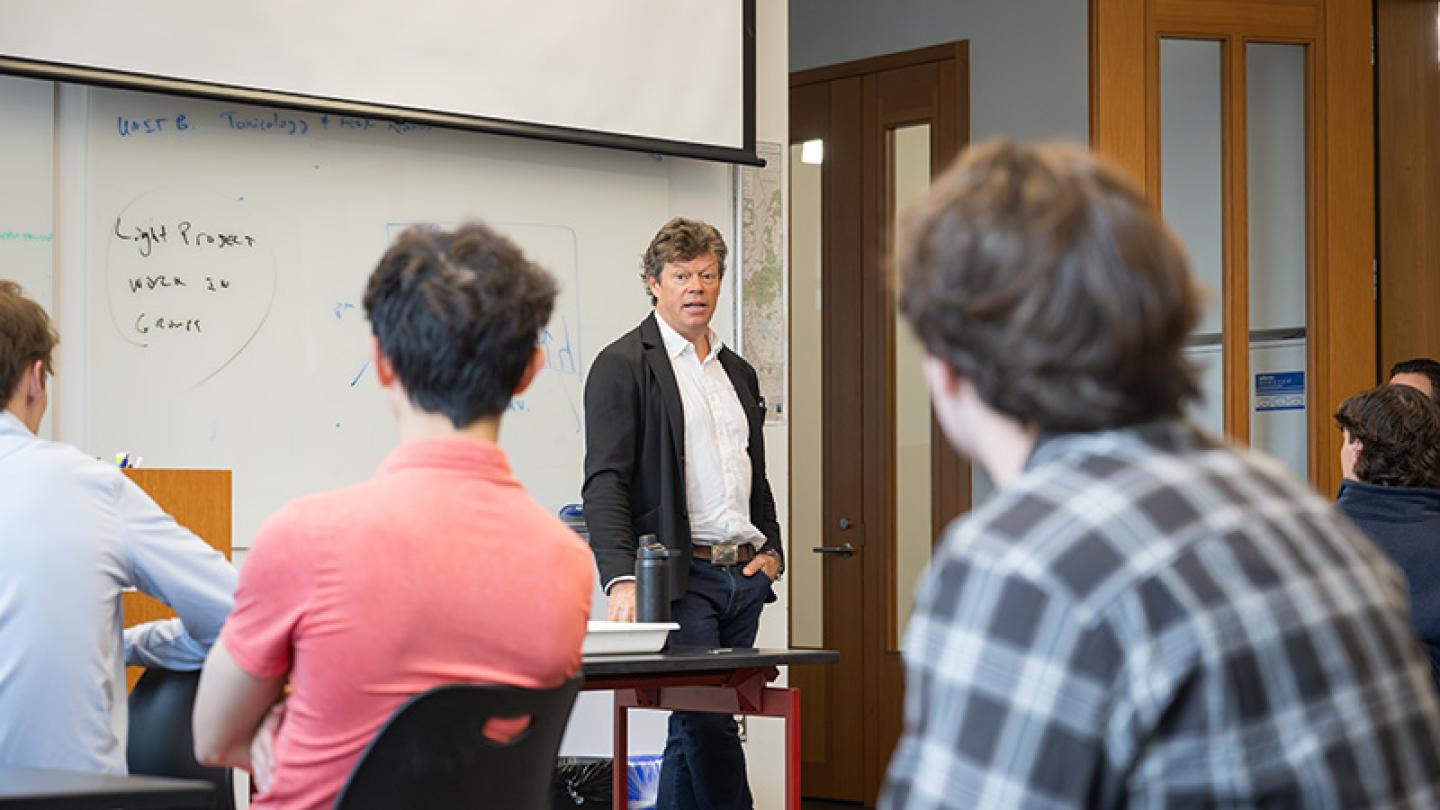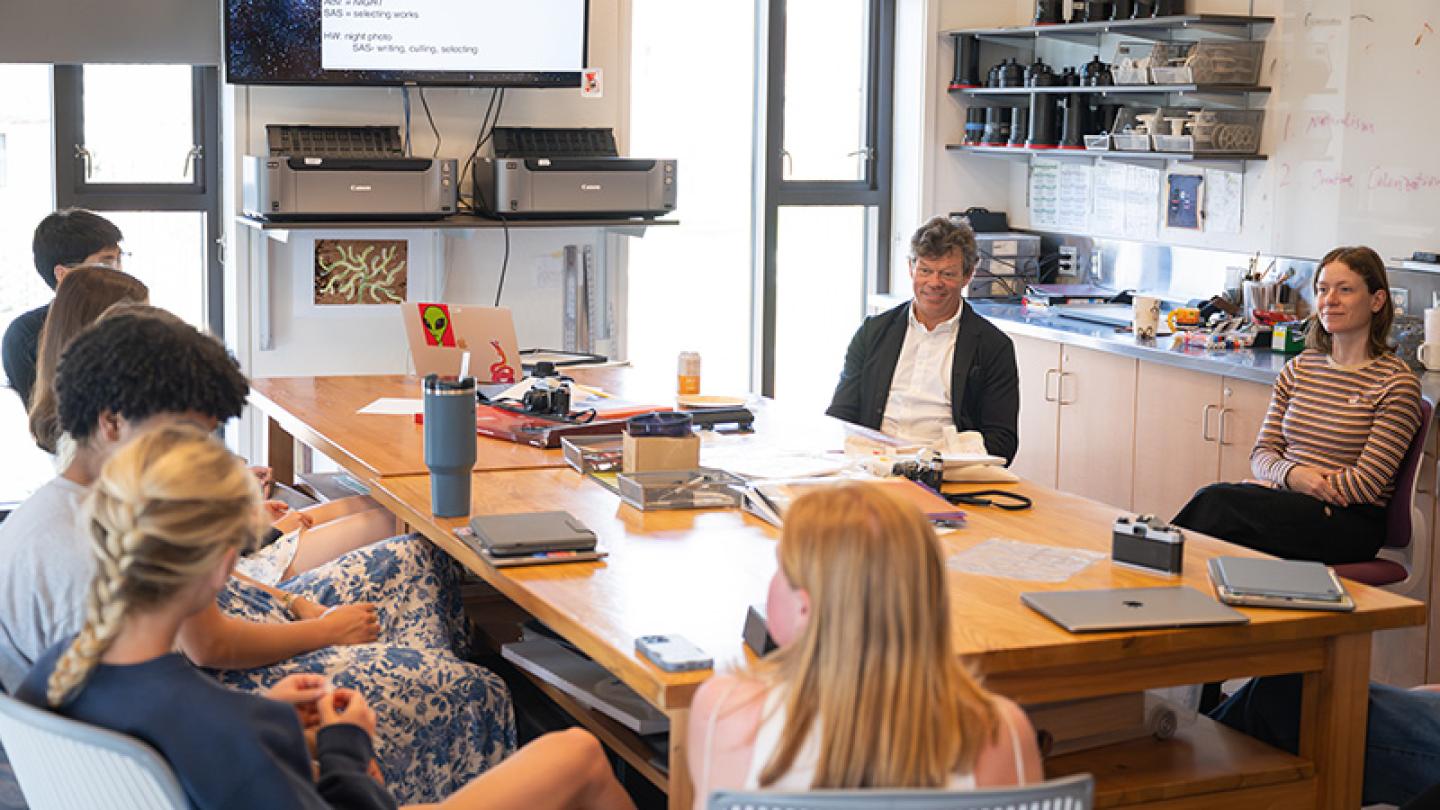

Conroy Distinguished Visitor Peter McBride ’89 inspires others to find wonder in, and protect, nature.
BY KATE DUNLOP
The Colorado River flows through seven states and two countries, supplies 40 million Americans with drinking water, and helps generate 10 percent of the U.S. GDP, but it has not consistently reached the sea in a meaningful way in almost three decades.
That’s just about the same amount of time that Peter McBride ’89, a self-taught photographer, filmmaker, writer and public speaker, has been honing his craft and traveling to more than 75 countries on assignment for National Geographic and other high-level clients.
On Earth Day, April 22, the Dartmouth graduate, St. Paul’s School Alumni Association Award recipient and former Knight Journalism Fellow returned to Millville as the 2024-25 Conroy Distinguished Visitor to offer remarks during a special chapel held in Memorial Hall, have lunch with students and visit classes.
In his chapel talk “Finding Your Path,” McBride, who grew up on a cattle ranch in Colorado, shared his experiences documenting environmental and cultural stories around the word, from Africa to Mt. Everest to Antarctica and most places in between, enduring extreme conditions to bring back not just stunning images of places but the stories of people, especially Indigenous peoples, and the Earth’s fragility. He’s seen the most beautiful locations and the most heart-breaking undercurrents of their reality, but instead of cynical hopelessness, he’s emerged with what he calls earned hope — and the conclusion that everyone can make a difference.
McBride’s path has most recently brought him closer to home. His third book, “The Colorado River: Chasing Water,” follows up on 2018’s “Grand Canyon: Between River and Rim,” which detailed a grueling 750-mile journey through what McBride describes as one of the most shattered and complicated landscapes in the world. A 2024 National Outdoor Book Award Winner and one of Smithsonian Magazine’s 10 Best Photography Books of 2024, “Chasing Water” is a comprehensive look at the 1,500 mile length of the river that runs through the canyon, the stressed and vital lifeline of the American Southwest whose waters are diverted to keep Las Vegas, Phoenix, Tucson, Los Angeles and other cities habitable.

McBride speaks in chapel about the dramatic diminishment of the Colorado River.
“Sitting here, you may think, well, that’s a bummer that the river doesn’t reach the sea anymore, but it has nothing to do with me,” McBride told an enthralled crowd in Memorial Hall while showing an aerial image of the river’s dried tendrils. “Well, 95% of America’s salad bowl — our lettuce, carrots, cauliflower in the winter months — come right from here, from the Colorado River. So, you all eat this river, whether you realize it or not.”
Despite the river’s dire drop in water levels, McBride finds hope in second chances: In 2018, less than 1% of the river was released so that it could flow to the sea, temporarily revitalizing the estuary with flora and fauna. He also finds it in the power of individuals like Renae Yellowhorse, a young Navajo woman he met during his travels who succeeded in uniting 13 tribes to oppose a billion-dollar development proposal that would have further harmed the river — and protected nearly 1 million acres around the Grand Canyon through her efforts.
“Nature, if we give it a chance, is totally resilient,” he said. “We’ve just got to work with nature.” And work together. “Anybody can make a difference, is the lesson I learned from [Yellowhorse],” McBride said.
McBride concluded his chapel remarks by saying he documents these moments to remind himself — and others — of “the awe and the wonder and the joy” of nature. “If we can find and reconnect with those things, as I think you do at St. Paul’s, it reminds you not only about the power of feeling small in nature, the humility that comes with it, but the importance of it,” he said. “When you head out on your path, be curious, be brave, try new things. There is no perfect path.”
Students responded enthusiastically to McBride’s message, with more than one saying they want to do what he does. “He introduced to me a life I never thought possible and showed us how he gets to have the most unique experiences while also serving the greater good of our planet, which is incredibly powerful,” Amelia Guest ’25 said. “It felt so good to see someone do the things that they love while also making a positive impact on the world.”
After visiting environmental science and honors Spanish classes, McBride ended his day in the advanced photography class of Arts Teacher Leigh Kaulbach ’08, where he offered both technical and practical advice, discussing everything from gear and how to shoot underwater to the reality of earning a living as a photographer and how he operates in the field.

McBride speaks to students in Environmental Science class.

McBride offers technical and practical advice to students in Advanced Photography class.
Nel Peter ’25, a photography student who would like to follow in McBride’s professional footsteps, said it was incredible to ask questions of someone with so much experience, adding that many students regarded his talk as the best of the year.
“I do pride myself, when I’ve been asked to do a story, on being a human first,” McBride said. “I’m a photographer second, so I’ll never stuff my camera into someone’s face. I’m there to build some trust …. I just feel like I’m telling stories about the natural world under pressure and trying to give a voice to the voiceless, whether wild places or Indigenous people.”
McBride does that through his art — through the arts, which should be valued, he says, as the voice of time and culture.
The Conroy Distinguished Visitors Program
Established to stimulate and inspire students at St. Paul’s School, to enlarge their view of life, and to suggest directions in which they can serve their country and their communities effectively, the Conroy Distinguished Visitors Program invites outstanding leaders in various fields to the School for discussions, meetings, schoolwide performances and lectures. Conroy Visitors have included poet/author Maya Angelou, cellist Yo-Yo Ma, the Chicago Symphony Singers, U.S. Poet Laureate Billy Collins and three-time Olympic gold medalist Misty May-Treanor among others.



